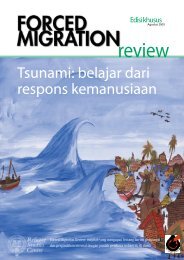FMR 42 full issue pdf - Forced Migration Review
FMR 42 full issue pdf - Forced Migration Review
FMR 42 full issue pdf - Forced Migration Review
You also want an ePaper? Increase the reach of your titles
YUMPU automatically turns print PDFs into web optimized ePapers that Google loves.
<strong>FMR</strong> <strong>42</strong><br />
Sexual orientation and gender identity and the protection of forced migrants 19<br />
have also affirmed that human rights law must<br />
apply to those discriminated against on the basis<br />
of sexual orientation or gender identity. Most<br />
recently, the European Court of Human Rights held<br />
that segregating LGBTI detainees violates their<br />
human rights and amounts to torture, inhuman<br />
or degrading treatment if it deprives them of<br />
meaningful access to detention centre services<br />
or is tantamount to penal solitary confinement. 3<br />
The Inter-American Commission on Human Rights’<br />
jurisprudence has increasingly addressed the human<br />
rights of LGBTI people, holding for the first time<br />
that the American Convention on Human Rights<br />
bars discrimination based on sexual orientation. 4<br />
In addition to these human rights standards,<br />
in 2006 a group of legal experts drafted the<br />
Yogakarta Principles, guidelines that address<br />
how basic human rights tenets relate to sexual<br />
minorities. 5 Although these principles are not<br />
binding on states, they articulate the primary<br />
international law protections for sexual minorities<br />
and offer states guidance on best practices for<br />
ensuring human rights of LGBTI populations.<br />
Shana Tabak tabak@wcl.american.edu is a<br />
Practitioner-in-Residence at American University’s<br />
International Human Rights Law Clinic. Rachel<br />
Levitan rslevitan@gmail.com is Senior Counsel<br />
(Refugees and <strong>Migration</strong>) at HIAS www.hias.org<br />
1. See Toonen v Australia, HRC Communication No. 488/1992, U.N.<br />
Doc CCPR/C/50/D/488/1992, para. 8.7 (1994).<br />
2. See Committee on Economic, Social and Cultural Rights, General<br />
Comment No. 14: The right to the highest attainable standard of<br />
health, August 11, 2000, E/C.12/2000/4.<br />
www.unhcr.org/refworld/docid/4538838d0.html<br />
3. ECHR, X v. Turkey (application no. 24626/09)<br />
4. www.cidh.oas.org/basicos/english/basic3.american%20convention.htm<br />
Atala Riffo and Daughters v. Chile, Merits, Reparations and Costs,<br />
Judgment, Inter-Am. Ct. H.R. 83-84 (February 24, 2012).<br />
5. Yogyakarta Principles on the Application of International<br />
Human Rights Law in relation to Sexual Orientation and Gender<br />
Identity, 2006 www.unhcr.org/refworld/<strong>pdf</strong>id/48244e602.<strong>pdf</strong><br />
LGBTI refugees: the Brazilian case<br />
Henrique Rabello de Carvalho<br />
Brazil has a long tradition of providing shelter and<br />
protection to people persecuted for political, racial<br />
and social reasons. Following the directives of UNHCR<br />
concerning the definition of a ‘social group’ as a<br />
cohesive and vulnerable group whose members share<br />
essential characteristics of identity, Brazil’s National<br />
Committee for Refugees (CONARE 1 ) has determined<br />
that sexual minorities should be considered as a<br />
social group for the purposes of applying the 1951<br />
Refugee Convention and Brazil’s Refugee Law. 2<br />
In analysing the question of the well-founded fear of<br />
persecution as grounds for claiming asylum, CONARE<br />
includes consideration of the criminalisation of sexual<br />
relations between same-sex adults when assessing<br />
the potential risk to life or freedom of the refugee<br />
applicant in their country of origin. 78 countries out<br />
of 193 still have legislation criminalising same-sex<br />
consensual acts between adults. Punishments range<br />
from a number of lashes (e.g. Iran) or two months<br />
in prison (e.g. Algeria) to life imprisonment (e.g.<br />
Bangladesh) or even death (Iran, Mauritania, Saudi<br />
Arabia, Sudan, Yemen). 3 By contrast, in May 2011 the<br />
Supreme Court of Brazil recognised that homosexual<br />
couples have the same rights as heterosexual<br />
couples, including the right to being treated equally<br />
and the right not to be discriminated against.<br />
However, public policies in defence and in favour of<br />
LGBT people are neither sufficient nor effective in<br />
reducing homophobic violence in Brazil. Violence<br />
against gays and lesbians – including murder –<br />
continues to rise. Brazil has no hate crime law and<br />
no public institution or specific project monitoring<br />
the occurrence of homophobic crimes and violence.<br />
A bill criminalising homophobia has been pending<br />
in the National Congress for more than ten years.<br />
In the meantime, recognition of sexual minorities<br />
as a social group in terms of claiming and providing<br />
asylum means that Brazil’s Refugee Law and the 1951<br />
Refugee Convention continue to be the most powerful<br />
tools in the defence of LGBTI refugee rights in Brazil.<br />
Henrique Rabello de Carvalho is a lawyer in Rio de<br />
Janeiro and member of LGBTI Rights Commission<br />
of the Brazilian Bar Association; he was formerly a<br />
lawyer with Caritas and the UNHCR office in Rio de<br />
Janeiro. This article reflects the personal views of its<br />
author henrique.carvalho@aol.com<br />
1. Established by the Ministry of Justice.<br />
2. Law nº 9.474/1997<br />
3. International Lesbian, Gay, Bisexual, Trans and Intersex<br />
Association http://tinyurl.com/ILGA-State-Homophobia-2012




